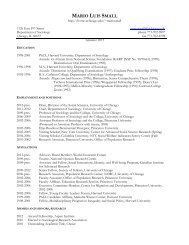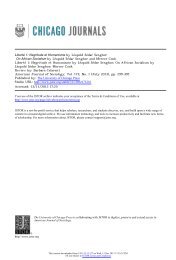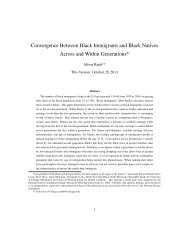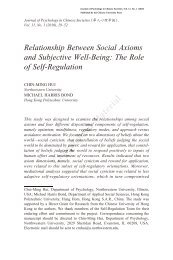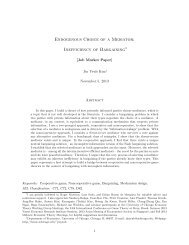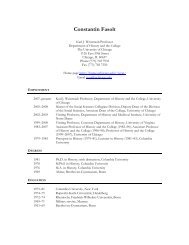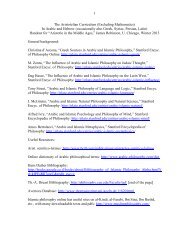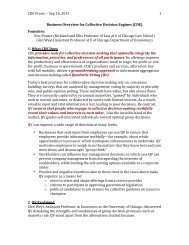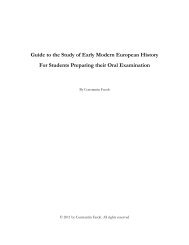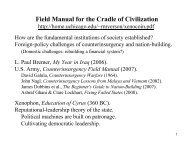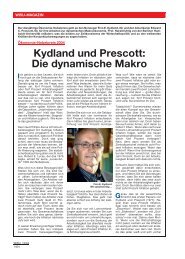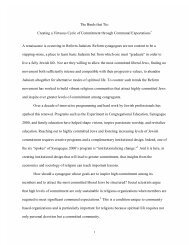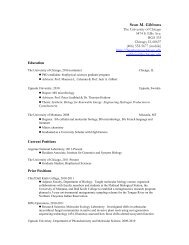Authoritarian Regimes - University of Chicago
Authoritarian Regimes - University of Chicago
Authoritarian Regimes - University of Chicago
Create successful ePaper yourself
Turn your PDF publications into a flip-book with our unique Google optimized e-Paper software.
Grades in this seminar will be based on three dimensions <strong>of</strong> course performance. First,<br />
each student is required to write three short (about 3-4 page) response papers to the<br />
weekly readings over the course <strong>of</strong> the quarter. These are worth 10% <strong>of</strong> your grade each,<br />
for a total <strong>of</strong> 30%. Which week these essays are written is at the student’s discretion, with<br />
one exception: everyone must contribute an essay on the readings in Week 3 (April 17th).<br />
Please e-mail me a copy <strong>of</strong> your essay by noon on the day <strong>of</strong> class, and hand in a hard<br />
copy <strong>of</strong> your essay at the beginning <strong>of</strong> seminar.<br />
Another 30% <strong>of</strong> your final grade will be based on class participation. Consistent<br />
attendance and engagement with the readings and in-class discussions are expected. The<br />
remaining 40% <strong>of</strong> your grade will be based on a take-home final examination,<br />
formatted loosely on the template <strong>of</strong> a qualifying Ph.D. exam.<br />
April 3: Class Introduction<br />
Course Schedule<br />
April 10: Totalitarianism as a Template<br />
• Daniel Chirot, Modern Tyrants, all.<br />
April 17: Problems <strong>of</strong> Classification<br />
• Juan J. Linz and Alfred Stepan, Problems <strong>of</strong> Democratic Transition and<br />
Consolidation: Southern Europe, South America, and Post-Communist Europe,<br />
Baltimore: Johns Hopkins <strong>University</strong> Press (1996), pp. 39-54.<br />
• Barbara Geddes, “<strong>Authoritarian</strong> Breakdown: Empirical Test <strong>of</strong> a Game Theoretic<br />
Argument,” paper presented at the annual meetings <strong>of</strong> the American Political<br />
Science Association, Atlanta (1999), pp. 1-33 + appendix.<br />
• Axel Hadenius and Jan Teorell, “<strong>Authoritarian</strong> <strong>Regimes</strong>: Stability, Change, and<br />
Pathways to Democracy, 1972-2003,” Working Paper, Lund <strong>University</strong><br />
(November 2006), pp. 1-24 + Appendix B.<br />
• Gerardo L. Munck, “Drawing Boundaries: How to Craft Intermediate Regime<br />
Categories,” in Schedler (ed.), Electoral <strong>Authoritarian</strong>ism, pp. 27-40.<br />
• Richard Snyder, “Beyond Electoral <strong>Authoritarian</strong>ism: The Spectrum <strong>of</strong> Non-<br />
Democratic <strong>Regimes</strong>,” in Schedler (ed.), Electoral <strong>Authoritarian</strong>ism, pp. 219-231.<br />
• Dan Slater, “Altering <strong>Authoritarian</strong>ism: Institutional Complexity and Autocratic<br />
Agency in Indonesia,” Unpublished Manuscript, pp. 1-36.<br />
• Lisa Wedeen, “Concepts and Commitments in the Study <strong>of</strong> Democracy,” in Ian<br />
Shapiro et. al. (eds.), Problems and Methods in the Study <strong>of</strong> Politics, New York:<br />
Cambridge <strong>University</strong> Press (2004), pp. 274-306.<br />
2



